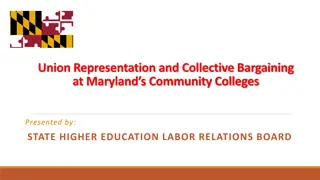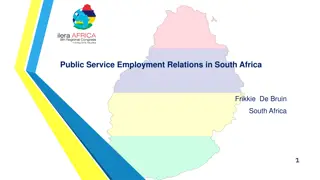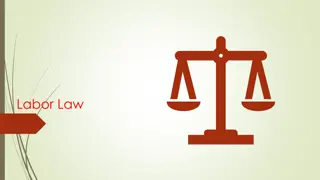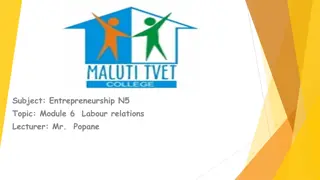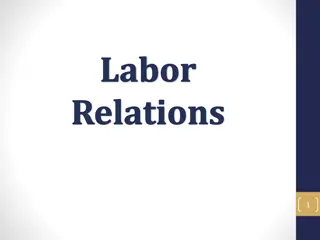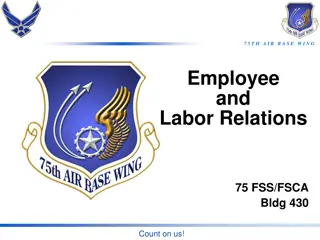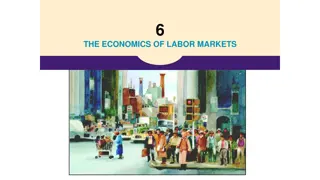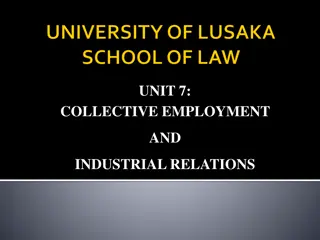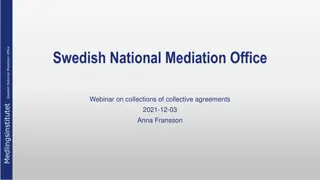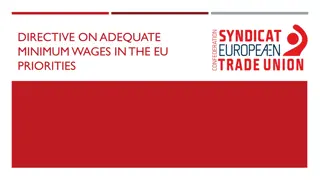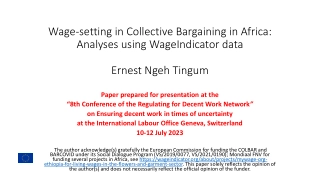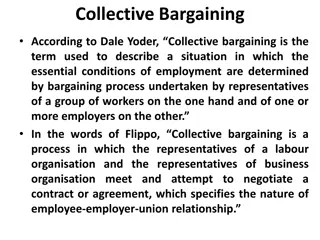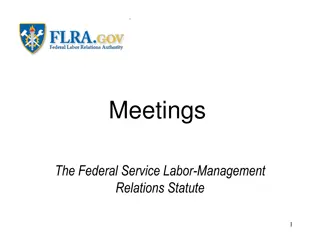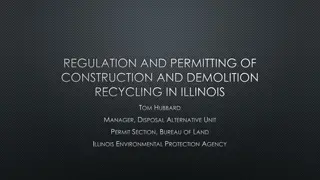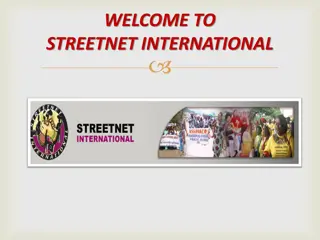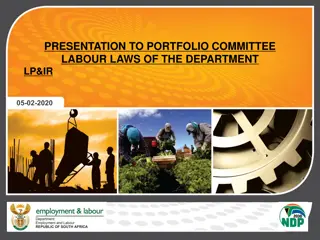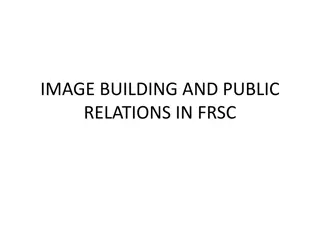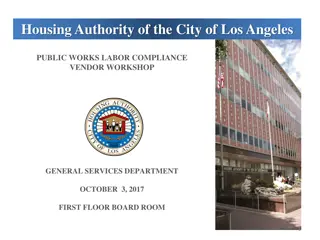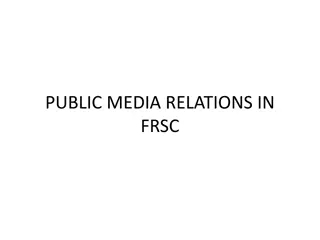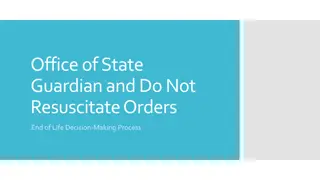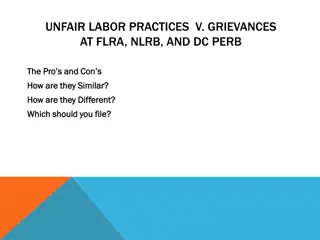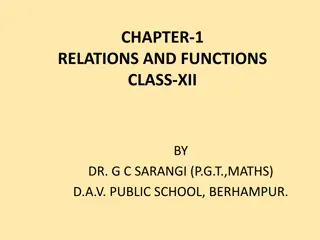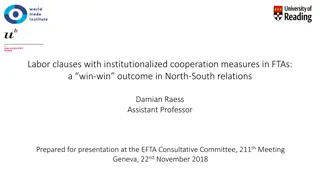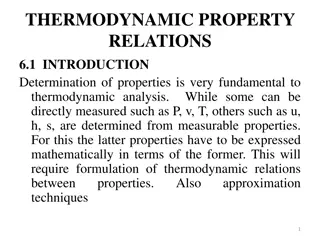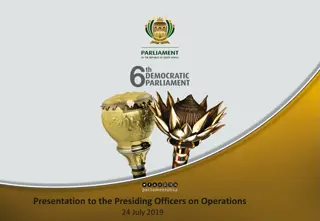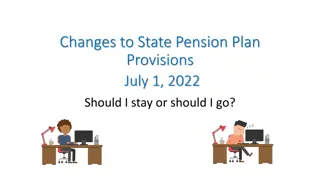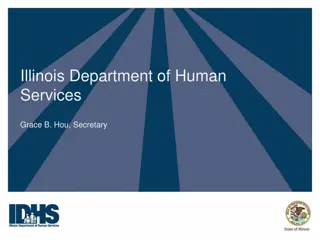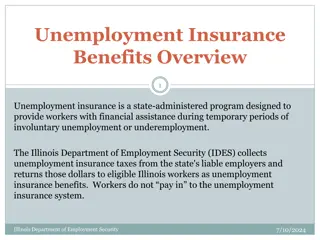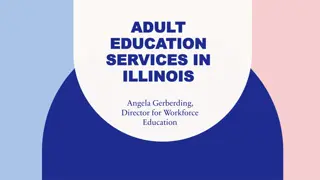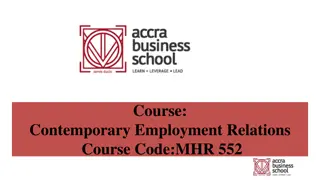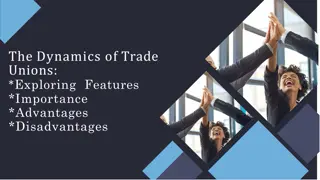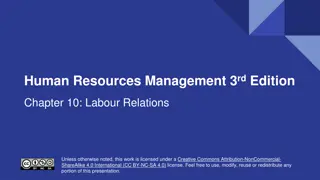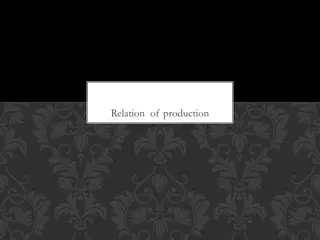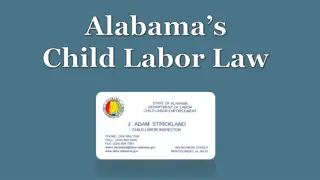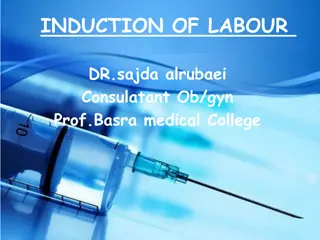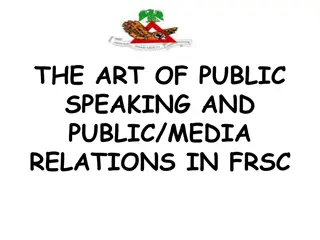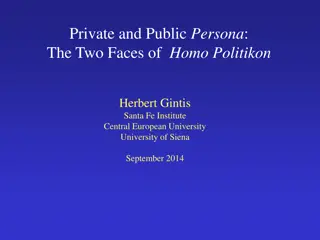A Guide to Collective Bargaining in Illinois: Understanding the Public Labor Relations Act
Dive into the essential aspects of collective bargaining within the framework of the Illinois Public Labor Relations Act. Learn about laws, coverage, and exclusions, including key provisions for public employers, employees, and labor organizations involved in negotiations.
Download Presentation

Please find below an Image/Link to download the presentation.
The content on the website is provided AS IS for your information and personal use only. It may not be sold, licensed, or shared on other websites without obtaining consent from the author. Download presentation by click this link. If you encounter any issues during the download, it is possible that the publisher has removed the file from their server.
E N D
Presentation Transcript
COLLECTIVE BARGAINING: A PRIMER FOR NEGOTIATIONS Thomas M. Melody Jason A. Guisinger Erin K. Lavery Klein, Thorpe & Jenkins, Ltd. 20 N. Wacker Drive, Suite1660, Chicago IL, 60606 312-984-6400
INTRODUCTION Illinois Public Labor Relations Act Unfair Labor Practices Collective Bargaining Arbitrations Practical Considerations during Negotiations
UNDERSTANDING THE LAW SOURCE OF LAW Illinois Statutes Illinois Public Labor Relations Act 5 ILCS 315/1 et seq. Agency Rules and Decisions Illinois Labor Relations Rules and Regulations Decisions of the Illinois Labor Relations Board (ILRB) Court Decisions
IL PUBLIC LABOR RELATIONS ACT Purpose: The purpose of the IPLRA is, to prescribe the legitimate rights of both public employees and public employers, to protect the public health and safety of the citizens of Illinois, and to provide peaceful and orderly procedures for protection of the rights of all.
Who is covered? The Act applies only to public employers, public employees, and the labor organizations which represent those public employees. Public employers include any unit of local government Public employees are individuals employed by a public employer Essential services employees are those public employees performing functions so essential that the interruption or termination of the function will constitute a clear and present danger to the health and safety of the persons affected in the affected community Police officers, firefighters & paramedics
Managerial Employees The Act does not cover managerial employees Managerial employee means an individual who is engaged predominantly in executive and management functions and is charged with the responsibility of directing the effectuation of management policies and practices. 5 ILCS 315/3(j)
Supervisors in Police Bargaining Units Sec. 3(r): Supervisor is an employee whose principal work is substantially different than that of his or her subordinates and who has the authority, in the interest of the employer, to hire, transfer, suspend, lay off, promote, discharge, direct, reward, or discipline employees, to adjust their grievances, or to effectively recommend any of those actions, if the exercise of that authority is not of a merely routine or clerical nature, but requires the consistent use of independent judgment. In determining supervisory status in police employment, rank shall not be determinative. The Board shall consider, as evidence of bargaining unit inclusion or exclusion, the common law enforcement policies and relationships between police officer ranks and certification under applicable civil service law, ordinances, personnel codes, or Division 2.1 of Article 10 of the Illinois Municipal Code, but these factors shall not be the sole or predominant factors considered by the Board in determining police supervisory status.
What the Act Protects It protects the following rights: the right to form, join or assist labor organizations without fear of discrimination, penalty or retaliation: the right to bargain collectively with their employer through representatives of their own choosing; the right to engage in other lawful, concerted activities for the purpose of collective bargaining; and the right to refrain from participating in any and all of these activities.
UNFAIR LABOR PRACTICES A public employer commits an unfair labor practice whenever it engages in any of the following acts: Interfering with, restraining or coercing employees in the exercise of their rights granted in the Act; or dominating or interfering with a labor organization; Discriminating against employees in order to encourage or discourage membership in/or support for a labor organization; Discriminating against an employee who has signed or filed an affidavit, petition or charge with the Board, or who has provided any information or testimony pursuant to the Act; Refusing to bargain in good faith with the exclusive bargaining representative; Violating any rule or regulation of the Board concerning the conduct of representation elections; Spending public funds to an external agent, individual, agency or association in an attempt to influence the outcome of a representational election; and Refusing to reduce a collective bargaining agreement to writing or to sign such an agreement. (Section 10(a) of the Act).
Unfair Labor Practices Cont. A labor organization commits an unfair labor practice whenever it engages in any one of the following: Restraining or coercing public employees in the exercise of rights granted in the Act or violating its duty to fairly represent employees by acting with intentional misconduct; Restraining or coercing a public employer in the selection of its representative for collective bargaining or grievance settlement purposes; Attempting to cause an employer to discriminate against an employee, thereby causing the employer to commit an unfair labor practice; Refusing to bargain in good faith, if it is the exclusive bargaining representative; Violating any rule or regulation of the Board concerning the conduct of representation elections; Discriminating against an employee who has signed or filed an affidavit, petition or charge with the Board, or has provided any information for or testified at a Board hearing; Unlawfully picketing a public employer; and Refusing to reduce a collective bargaining agreement to writing or to sign such an agreement. (Section 10(b) of the Act).
Who may file an unfair labor practice charge? A public employee, labor organization or a public employer may file unfair labor practice charges with the Illinois Labor Relations Board. An individual cannot file a charge alleging a violation of either the Employer's or Union s duty to bargain in good faith The Union represents an individual when it files a charge on behalf of the individual When against the Union or otherwise without union assistance, the individual represents himself or hires an attorney to represent him/her
Procedures for Unfair Labor Charges A charge must be filed with the Illinois Labor Relations Board ( Board ) within six (6) months of the date the alleged violation occurred, or within six (6) months of the date the charging party should have reasonably become aware of the alleged violation (Section 11(a) of the Act) The person or entity filing the charge has the burden of proof
Procedures for Unfair Labor Charges Once filed with the Board, the charge is assigned to a Board investigator The investigator talks with the parties and obtains information surrounding the charge If there is an issue of law or fact, the Executive Director will issue a Complaint for Hearing and set the matter for hearing before an Administrative Law Judge ( ALJ ) A Complaint sets forth the dispositive facts and allegations; names the ALJ and requires the Respondent to answer each of the allegations in the Complaint prior to a hearing If the investigation reveals there are no issues of law or fact to support a Complaint, the Executive Director will dismiss the unfair labor practice charge The charging party may appeal the dismissal to the appropriate Panel of the Board within 10 days after service of the notice of dismissal
Procedures for Unfair Labor Charges At a hearing, the parties have an opportunity to question witnesses under oath, present relevant evidence, argue orally and present written briefs. The ALJ will issue a written Recommended Decision and Order Parties may appeal a Recommended Decision and Order by filing exceptions with the Board within 30 days of receiving the Recommended Decision. Exceptions must include a detailed written brief in support of the exceptions The Board will review the records and the exceptions and issue a ruling either affirming or reversing the ALJ s recommended decision Decisions of the Board can be appealed directly to the Appellate Court
COLLECTIVE BARGAINING Section 3(b) of the Act defines collective bargaining as bargaining over terms and conditions of employment, including hours, wages, and other conditions of employment, as detailed in Section 7 and which are not excluded by Section 4
IPLRA- Collective Bargaining Sec. 4. Employers shall not be required to bargain over matters of inherent managerial policy: Functions of the employer Standards of services Overall budget Organizational structure and selection of new employees Examination techniques and direction of employees Employers shall be required to bargain over: Policy matters directly affecting wages Hours and terms and conditions of employment Impact thereon upon request by employee representatives Management Rights.
Mandatory Subjects of Bargaining The U.S. Supreme Court held that overtime pay, shift differential pay, severance pay, pension and profit sharing are considered mandatory subjects of bargaining Not an exclusive list Test to determine if it is a management right or a subject of bargaining: Does the subject involve wages, hours, or other terms of employment Does the subject involve inherent managerial authority If the answer to both above is yes then weigh the benefits bargaining has on the decision-making process with the burdens that bargaining imposes on the employer s authority If benefits outweigh burden, then it is a mandatory subject of bargaining
Mandatory Subjects of Bargaining: Guidelines for Employee Conduct FACTS: The Transit Authority made changes to its code of conduct, used by supervisors as a guideline for disciplining employees. The guidelines set out the procedures for discipline including verbal warnings, written warnings, interviewing employees, and so on. The Transit Authority never negotiated the changes to the guidelines with any of the unions representing its employees. One of the changes to the guidelines was the removal of the written warning step in the discipline process.
Mandatory Subjects of Bargaining: Guidelines for Employee Conduct ANSWER:Changes to the code of employee conduct is a subject of mandatory bargaining in this case because the Transit Authority s decision to change the guidelines affects the wages, hours and working conditions of union members. The unilateral elimination of a step in the disciplinary process means that an employee would be subject to suspension at the second, instead of the third step in the process. CTA Trade Coalition, 22 PERI 120 (2006).
Mandatory Subjects of Bargaining: Layoffs of Employees ISSUE: The Forest Preserve District decided to hire a private contractor to take over the operations of a golf course it owned and operated, and to layoff 97 employees as a result.
Mandatory Subjects of Bargaining: Layoffs of Employees ANSWER: An employer s decision to layoff employees is inextricably connected with the terms and conditions of employment and is therefore a mandatory subject of bargaining. Conducting layoffs necessarily implicates the terms and conditions of employment and under Central City such layoffs must be bargained. Forest Preserve District of Cook County v. ILRB, 21 PERI 42 (2006) (Illinois Appellate Court, 1st Dist.).
IPLRA: Collective Bargaining Sec. 6. Right to organize and bargain collectively; exclusive representation; and fair share arrangements. (a) Employees of the State and any political subdivision of the State are protected in the exercise of: The right of self-organization, The right to form, join or assist any labor organization, To bargain collectively through representatives of their own choosing on questions of wages, hours and other conditions of employment The right to engage in collective bargaining activities or other mutual aid or protection, free from interference, restraint or coercion The right to refrain from such activities
IPLRA: Collective Bargaining Section 7: Duty to bargain. A public employer and the exclusive representative have the authority and the duty to bargain collectively as set forth in this Section. Collective bargaining means mutual obligation to: Meet at reasonable times in advance of the budget making process Negotiate in good faith wages, hours, conditions of employment Execute a written contract incorporating any agreement reached The employer and the exclusive representative are not compelled to agree to a proposal nor to make concessions
IPLRA: Grievance Procedures Section 8: States that a grievance procedure must be established between employer and Union to resolve disputes The procedure will apply to all employees in the bargaining unit Will provide for final and binding arbitration of disputes concerning the administration or interpretation of the agreement unless parties mutually agree otherwise All grievances are subject to the Illinois Uniform Arbitration Act
Grievance Arbitration The parties have the authority to decide whether grievances will be subject to arbitration. Can expressly state which portions of the CBA or other rights are entitled to arbitration Arbitration clause in Croom mandated arbitration only for grievances over express provisions of the collective bargaining agreement. Because the question of additional pay was not expressly addressed in the agreement, it was therefore not subject to arbitration. See Croom v. City of Dekalb, 71 Ill. App. 3d, 370, 375 76 (2d Dist. 1979) Arise under CBA is much broader language
Grievance Arbitration & Strike Grievance arbitration focuses on resolving disputes regarding the interpretation and application of an existing agreement When a collective bargaining agreement includes a no-strike provision, it must allow for grievance arbitration A no-strike provision voluntarily entered into does not entitle employees to interest arbitration
Scope of Grievance Arbitration Grievances generally include any claim that the collective bargaining agreement has been violated or any claim that the collective bargaining agreement is not being interpreted, applied or enforced in a manner contemplated by the agreement. Arbitrator's authority is generally limited to his interpretation, application or enforcement of the existing labor agreement Authority does not extent beyond four corners of labor agreement Arbitrator typically does not have power to add to, subtract from, modify or delete any provision of the labor agreement.
Selecting an Arbitrator The contract should specify that the arbitrator will be selected either from A selected panel of arbitrators; American Arbitration Association; or Federal Mediation and Conciliation Service
The Hearing Process The Issue The Burden of Proof Opening Statement Examination and Cross Examination Evidence Close of the Hearing and the Arbitrator's Decision
Key Considerations Past Practice: Where the application of a contract provision is ambiguous and subject to interpretation, Arbitrator will heavily lean on how the parties have previously applied the particular provision. Negotiating History: Withdrawn proposals can provide clarity into the understood meaning of a provision. Stare Decisis: Though not binding, a previous arbitration decision may be persuasive authority.
Principles of Construction A party cannot obtain in arbitration what he sought but failed to obtain in negotiations. Specific language takes precedent over general language. To express one thing is to exclude another. Avoidance of harsh result.
Vacating an Award CBA may specifically provide that an arbitrator's decision shall be final and binding. The Uniform Arbitration Act provides authority to challenge the ruling of the arbitrator if the arbitrator did not (1) follow the applicable rules of law, (2) decide in accordance with terms of the contract, or (3) take into account the uses of trade applicable to the transaction. 710 ILCS 5/8 (2010). Grounds for vacating an award: (1) the award was procured by corruption or fraud, (2) the arbitrator was partial, (3) the arbitrator exceeded his or her powers, (4) the arbitrator unreasonably refused to postpone the hearing or hear evidence, or (5) there was no agreement to arbitrate, (6)where a gross error of law or fact appears on the award s face.
IPLRA: Interest Arbitration Section 17 of the Act prohibits security employees, as defined in Section 3(p) of the Act, Peace Officers, Fire Fighters, and paramedics employed by fire departments and fire protection districts from striking. As a result of being prohibited by law (in contrast to agreement) from striking, those employees are entitled to interest arbitration.
Interest Arbitration Interest Arbitration focuses on resolving disputes regarding the new or next labor agreement. Parties present evidence, data and arguments in support of their position that a particular provision should be included in the next contract, which arbitrators will propose or award. Binding on both parties.
Impasse/Interest Arbitration Under the IPLRA Section 14: Security Employee, Peace Officer and Fire Fighter Disputes. Prior to engaging in interest arbitration, parties must reach impasse Upon impasse, mediation shall begin 30 days prior to the expiration date of a collective bargaining agreement, (or upon 15 days notice for an initial collective bargaining agreement) unless the parties mutually agree on some other time limit Either party may request arbitration if any dispute has not been resolved within 15 days of the last meeting of the parties and the mediator
No Strike Under the IPLRA Clear and Present Danger Section 18: (a) If a strike, which may constitute a clear and present danger to the health and safety of the public, is about to occur or is in progress, the public employer concerned may petition the board to make an investigation and conduct a hearing. If the board finds that within 72 hours there is a clear and present danger to the health and safety of the public, the employer shall petition the circuit court where the strike is about to occur or is in progress for appropriate judicial relief to stop the strike or to set conditions and requirements which must be complied with by the exclusive representative, to avoid or remove any such clear and present danger. The Court may allow the strike to occur or order essential employees back to work if it finds it necessary to protect public health and safety from clear and present danger.
Contractual Issues The Act Takes Precedence. Any collective bargaining contract between a public employer and a labor organization executed pursuant to 5 ILCS 315 shall supersede any contrary statutes, charters, ordinances, rules or regulations relating to wages, hours and conditions of employment and employment relations adopted by the public employer or its agents. Any collective bargaining agreement entered into prior to the effective date of this Act shall remain in full force during its duration.
Bargaining Teams Neither side can dictate who to include or exclude from their respective teams. The parties may agree to limit the number of bargaining team members. The bargaining teams are expected to have authority to enter into tentative agreements on contract proposals. The employer s team should not include a majority of the members of the Board so that a Board commitment to an issue cannot be immediately made at the table. If a majority of the Board is present, the union will put intense pressure on the members who are present to commit to a position. The employer's team should include an administrator who is familiar with the day- to-day operation of the public body so that the employer s team can have reliable information available if the union asserts that there are operational problems. It may be advantageous to not have the chief administrator at the table. The employer s team can rely on taking issues back to the administrator for review. Additionally, unions sometimes portray the chief administrator as the bad guy, so that there is a rallying point for the membership and having the chief administrator at the table may cause issues. The team should select a spokesperson so that statements made at the table are clear and consistent.
Ground Rules Guidelines to govern bargaining May mutually agree to dispense with or relax them Can include things like: No discussion with media Time limit on meetings Structure of proposals
The First Proposal First proposal should come from the union. Employer may base its response on the union s proposal. Do not bargain in a piecemeal fashion.
Employer Responses Employer response may not be Take it or Leave it. Employer is not required to accept union s proposal.
Strategic Considerations The bargaining table is a place to solve problems both sides should explain their proposals Make new language proposals appear to be as similar to existing language as possible Agree on the scattergram composition as soon as possible Scattergram composition should not be changed form year to year Be wary of regressive bargaining Use of package proposals Use of the supposal
Strategic Considerations Use of the sidebar Understand the theory of diminished expectations Know how each proposal affects each member of the union s team Cost the union s financial proposal on your own Statements made at and away from the table send messages Sleeping dogs Sacred cows
Negotiating Interest Based ( Win-Win ) Format
Foundations of Interest Based Bargaining Interest Based Bargaining ( IBB ), known as win-win and mutual gains abandons the formal spokesperson and exchange of written proposals and allows participation by many individuals and focuses on interest based problem solving techniques Extensive training of the teams in problem solving and listening techniques Commitment of all or most of the members of the Employer in the training and bargaining sessions Willingness of all participants to follow the IBB format and principles
Benefits of IBB Open exploration and discussion of issues Union may develop greater appreciation of the board s limitations and interests Process may dissipate acrimony built up as the result of previous negotiations Expedited process with a deadline
Disadvantages of IBB Unrealistic expectations Multiple participants raise possible contract language problems and grievances Bargaining history is more difficult to discern and verify Individuals may become subject to personal attacks Significant time commitment from all participants
Training IBB Process requires training Training Providers Time Commitment Focus of Training Preview of the Process Identify issues of mutual concern Identify various interests the parties share Develop standards for evaluating possible solutions
The Process Extended time periods for sessions Establish subcommittees to address certain issues Compressed time period with specific deadlines for completion Participation by all bargaining team members Options and solutions are freely expressed Participants use active listening techniques



